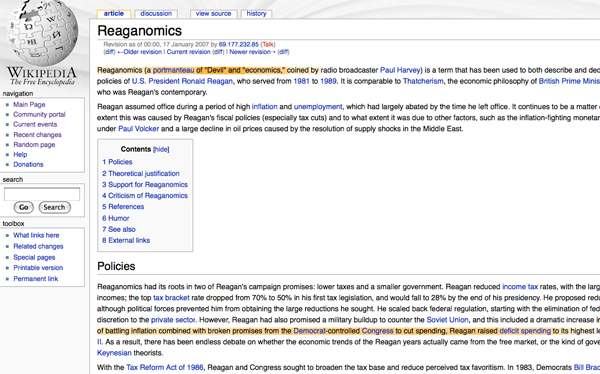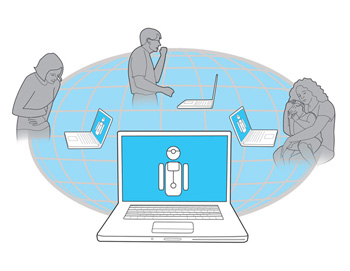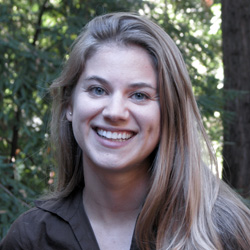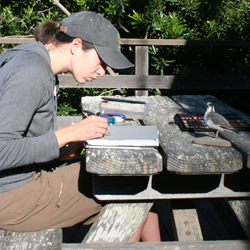In Wiki We Trust
Can computer scientists make Wikipedia more reliable? Hadley Leggett plunges into the weird world of Internet collaboration. Illustrated by Jessica Shult Huppi and Margaret E. Gibson.

Illustration: Jessica Shult Huppi
You can find almost anything on Wikipedia. Type "hurricane" into the search box, and you'll get a comprehensive overview of tropical storms, complete with colorful diagrams and links to weather stations around the world. On Ludwig van Beethoven's page, you can listen to all three movements of his Moonlight Sonata. If you're seeking a destination for your next Mediterranean vacation, you can learn about Porchesia, a little slice of island paradise off the coast of Syria.
Wait, Porchesia? Let's hope you didn't book plane tickets based on Wikipedia. Despite the detailed entry about Porchesia and its 354,897 inhabitants, the island doesn't exist. Even worse, it took Wikipedia editors 10 months to discover the bogus page and delete it.
Each month, about 60 million people visit Wikipedia—a free, open-access online encyclopedia with more than 12 million articles in 260 languages. Despite its popularity, Wikipedia has major drawbacks. Anyone with an Internet connection can contribute, so the site is subject to vandalism, bias, and misinformation. And edits are anonymous, so there's no way to separate credible information from fake content created by vandals.
Because of these unpredictable qualities, many college professors have forbidden students from citing Wikipedia in their papers. At one unfortunate newspaper, reporters published two wiki-based blunders in a row. The next day, a fed-up editor added “using Wikipedia” to the list of offenses that could get someone fired.
But according to computer scientists at UC Santa Cruz, banning Wikipedia won't solve the problem. “I think it's incredibly short-sighted,” says Luca de Alfaro, who runs UCSC's Wiki Lab.
Instead of trying to stop the flood of collaborative online content, de Alfaro wants to help users know when to trust Wikipedia—and when to reach for that dusty Encyclopedia Britannica on the shelf. His group has created a gadget called "WikiTrust," which assigns a color code to newly edited text based on the reliability of its author. It's a simple concept: The more often a person's contributions are thrown out, the less reliable they're likely to be.
“They've hit on the fundamentally Darwinian nature of Wikipedia,” says graduate student and Wikipedia enthusiast Virgil Griffith of the California Institute of Technology. “Everyone's injecting random crap into Wikipedia, and what people agree with more often sticks around. Crap that people don't like goes away.”
Wikipedia: A happy accident?
Wikipedia began as an offshoot of another free online encyclopedia, called Nupedia, but Wikipedia quickly surpassed its parent site in size and popularity. The difference? Nupedia's articles were written by experts and had to undergo a long peer-review process. During its three-year existence, Nupedia produced only 24 finished articles.
To speed things along, Nupedia's founders decided to try an experiment: What if they made a sister site, where anyone could create and edit pages? They hoped the new site would generate content that experts could review and eventually add to Nupedia.
They called their idea “Wikipedia,” after wiki software, which allows many people to edit the same Web page at once. The name “wiki” comes from the Hawaiian word meaning “fast.” Indeed, Wikipedia grew faster than anyone expected. Within a year of its launch in January 2001, the encyclopedia had accumulated 20,000 entries.
“The fact that Wikipedia took off and allowed anyone to edit, I think it was a bit of a historical accident,” says Wikipedia expert Joseph Reagle of New York University, who wrote his PhD thesis about the encyclopedia's unique culture.
Initially, anonymous edits helped the site gain popularity, Reagle says. As the project gained momentum, it attracted an astonishing number of loyal fans. They call themselves “Wikipedians,” and they spend countless hours creating and editing pages. Reagle traces the Wikipedia craze back to an innate human desire to collect and archive facts. “I think there's an ancient bibliophilic passion,” he says, “and then Wikipedia boosts that up a level, because it's incremental. You can make a change even if you don't have a lot of time that day.”
With millions of eyes scanning its pages and correcting mistakes, Wikipedia achieved a surprising level of correctness. A 2005 study conducted by Nature concluded that, at least for science articles, Wikipedia was nearly as accurate as the Encyclopedia Britannica.
Getting wiki right
But rapid expansion led to growing pains. Wikipedia has struggled against a burgeoning tide of spammers, vandals, and folks who just don't know what they're doing.
“Everyone wants to give it a try,” says Ellen Levy Finch of San Jose, California, who edits Wikipedia under the username Elf. “Those under the age of 18 or who've had one too many beers apparently find it hysterical to insert profanities into the middle of articles and other random stuff.”
Even just a few bad pages can erode the public's trust. For example, when journalist John Seigenthaler discovered a Wikipedia page linking him to the Kennedy assassinations, he wrote a scathing editorial in USA Today. In January 2009, Wikipedia made headlines again: After Senator Ted Kennedy suffered a seizure at President Obama's inauguration, he met an untimely death on his Wikipedia page—yet recovered nicely in real life.
“Out of the many millions of Wikipedia articles,” Reagle says, “it only takes a couple that have something libelous or wrong to be very embarrassing and detrimental.”
To keep Wikipedia accurate, nearly 3,000 volunteers serve on the Recent Changes Patrol. They monitor newly edited pages, and they've developed tools to check for mistakes and vandalism. For example, special computer programs called “bots” use semantic analysis to pick out words and phrases likely to be spam. Bots flag the lines of “jerk jerk jerk” that keep popping up on George W. Bush's page and the intentionally scrambled words that appear almost daily in the “dyslexia” entry.
In 2007, CalTech's Virgil Griffith introduced another innovative way to stymie spammers. Called the WikiScanner, Griffith's tool traces anonymous Wikipedia edits to their source's IP address, an identification number assigned to each computer connected to the Internet. By combining this tracking with data on which companies own which IP addresses, WikiScanner created quite a stir. It revealed that Wal-Mart, Starbucks, and even members of the U.S. Congress had spruced up their own Wikipedia pages. Folks at The New York Times and BBC had vandalized Bush's page.
Griffith, 25, calls himself a “disruptive technologist.” He created WikiScanner to punish politicians and corporations who whitewash their own pages. But his tool doesn't make bad content easier to spot, and that's why Griffith thinks a gadget like WikiTrust is crucial. “One of the biggest criticisms of Wikipedia is saying, 'Hey, that page you're looking at could have been edited five minutes ago by a crazy person,'” he says. “WikiTrust blows that criticism out of the water.”
Humble beginnings
De Alfaro's journey into Wikipedia began when he wanted an easier way to share his favorite recipe for Pasta all'Arrabiata with friends and family. For a computer scientist with a background in game theory, what better way to exchange cooking advice than to create a wiki?
His CookiWiki attracted people who wanted to share recipes, but it also appealed to vandals. Instead of getting frustrated, de Alfaro began to brainstorm. “I started to think there has to be some way to give people an incentive to behave in a more productive way,” he says. De Alfaro came up with the idea of a reputation system for Wikipedia. He hoped it would encourage editors to make worthwhile changes, while also helping readers sort reliable content from misinformation.
Collaborative websites such as Amazon.com and eBay already have reputation systems based on user ratings. For instance, if you write a book review on Amazon.com, other readers can boost your user rank if they liked what you wrote—or lower your rank if they didn't. Many people proposed creating a similar reputation system for Wikipedia, but de Alfaro feared that user-generated ratings might upset Wikipedia's collaborative atmosphere. He also didn't want to create more work for editors. “If something works as well as Wikipedia,” de Alfaro says, “you think very hard before proposing to modify it in such a way that everybody has to give comments on everybody else.”
Since Wikipedia already keeps track of every revision, de Alfaro realized he could use that data to create a reputation system independent of human input. “Machines should work for humans and not the other way around,” he says. “So if you can get information without bothering people, via clever algorithms, this is much better.”
Welcome to WikiTrust
The Wiki Lab built its trust tool around the principle that Wikipedia pages tend to improve over time, or at least to move toward consensus. You can measure an author's trustworthiness by looking at how long his or her edits persist over time, says UCSC graduate student Bo Adler, who worked on WikiTrust with de Alfaro. “When you add something to Wikipedia and it lasts a long time, you did a good job,” Adler says. “If it gets erased right away, you did a bad job.”
Based on an editor's past contributions, WikiTrust computes a reputation score between zero and nine. When someone makes an edit, the background behind the new text gets shaded orange depending on the author's reputation: the brighter the orange, the less “trust” the text has. Then when another author edits the page, they essentially “vote” on the new text. If they like the edit, they'll keep it, and if not, they'll revert it. Text that persists will become less orange over time, as more editors give their votes of approval.
 |
Image: Courtesy of the Wiki Lab, UC Santa Cruz |
| A screen shot illustrates the orange color-coding used by WikiTrust, with the least reliable edits in bright orange. |
The Wiki Lab spent months optimizing the WikiTrust algorithm. “We try to predict when things are going to be deleted,” Adler says. “We want words that are going to be deleted to have a low trust, and words that are not going to be deleted to have a high trust.” They also wanted to balance the need to flag questionable text with the need to keep the page readable. Too much orange text would turn people off, Adler says.
The team designed WikiTrust to detract as little as possible from the Wikipedia experience. The gadget hides in a tab at the top of the screen. If you don't want to bother with trust ratings, Adler says, don't click on the “trust info” tab. And don't go hunting for your own orange ratings: The team decided not to display user reputation to avoid discouraging new users. “Even if you're a wonderful biologist,” de Alfaro says, “if you haven't written very much at all on Wikipedia, your reputation will be low.”
Coming to a wiki near you
In November 2008, the Wiki Lab published WikiTrust 2.0, the latest version of its software. Now anyone who hosts a wiki can download the program and run WikiTrust in real time. For instance, de Alfaro installed WikiTrust on his CookiWiki.
The Wiki Lab has also been working closely with the WikiMedia Foundation, the nonprofit organization that manages Wikipedia. WikiMedia has been supportive of the work, but the process of getting WikiTrust on the main site has been slow. For now, Wikipedia users can only explore a demo version of WikiTrust—but that's about to change.
After years of collaboration, WikiMedia bigwigs finally decided in April 2009 to make WikiTrust available for all registered Wikipedia users. The launch date for the new gadget has not been set, but de Alfaro thinks it will go live in September or October.
Some critics think there may be hurdles to running the trust tool over the entire site. “This isn't a trivial web architecture design and implementation issue,” says Ed Chi of the Palo Alto Research Group, who studies Wikipedia and social cognition. Since WikiTrust assigns a reputation score to every word in every article, running the program in real time will demand significant processing power and several terabytes of extra disk space. “It would require a whole new infrastructure for Wikipedia to handle this,” Chi says.
Wiki Lab researchers already are working on making their gadget more efficient. Using the first version of WikiTrust, it took a regular computer 20 days to process five years of Wikipedia revision data. The latest edition cuts that time to four days, and it can calculate trust ratings for 30 to 40 revisions per second. “That's on a single machine,” Adler says. “So it's very practical for us to keep up with Wikipedia.”
Measuring truth—or consensus?
WikiTrust can detect most types of questionable content. But when asked whether his gadget measures "truth" on Wikipedia, de Alfaro hesitates. WikiTrust determines trustworthiness based on how many people agree with a particular passage of text. But majority approval doesn't guarantee truth. “If 20 people are all biased in one way, our tool does not know it,” de Alfaro says. “Our tool can simply measure consensus.”
Adler offers a hypothetical example. “What if Wikipedia was dominated by Nazis?” he says. “Whatever you say about the Holocaust, they're going to revert you, and then other people are going to come and support those edits rather than your edits.” In that case, WikiTrust would start flagging your Holocaust content as unreliable—no matter how accurate it was.
Trial by consensus sounds sketchy, but majority opinion has nearly always dictated society's definition of truth. A 15th century encyclopedia would have insisted that the sun revolves around the earth. The 1911 edition of the Encyclopedia Britannica asserted that bacteria causes the flu, since viruses hadn't been discovered yet. So perhaps it's not a question of whether to trust consensus. Rather, whose consensus do you want to trust: a handful of experts, or thousands of anonymous Internet users and a clever computer algorithm?
Sidebar: Will wiki work for health information?
 |
Illustration: Margaret E. Gibson |
With four children under age 5, James Currier had lots of questions about sniffles, rashes, and fevers. One late night, while holding a sick child in his lap, he tried searching for answers online.
"I was shocked," Currier says. "I couldn't find anything easy to read, explanatory, and credible, that wasn't covered with pharmaceutical ads or Botox commercials."
Currier didn't know much about medicine, but he knew a lot about the Internet. As an expert in user-generated media and social networking, he wanted a better way to share health information online. So in February 2009, with support from medical schools around the country, Currier launched Medpedia, a wiki-style Internet encyclopedia for medical information.
Unlike its famously successful counterpart, Wikipedia, Medpedia doesn't abide by the motto “Anyone can edit.” Only physicians and qualified PhDs may make real-time changes. Others can propose edits using a “suggest changes” button, but the material won't go live until approved by an editor with the right credentials. The site's creators hope expert-only editing will ensure accurate content.
At the same time, restricting the site to experts will limit the number of people who can contribute, and it may slow the site's growth. "That's the key question," says public-health physician John Swartzberg of the University of California, Berkeley, a volunteer adviser for Medpedia. "Will physicians and PhDs spend their time vetting this material?"
To encourage busy physicians and researchers to participate, Medpedia offers networking for health professionals and organizations. It also gives credit to experts who contribute to the site. Like Wikipedia fans, supporters of Medpedia say they were also drawn to the site's altruistic goals.
"We were quite taken with the idea that this would be a kind of open system," says information technology expert Henry Lowe of the Stanford University School of Medicine. "All the information in Medpedia would be high quality, reliable, up-to-date, and obtained by experts. It would be available to the world at large, free and unrestricted."
Although more than 110 organizations have contributed or pledged to contribute content, the site is still in its infancy. Users can create a profile and get updates on topics that interest them, but for now, Medpedia doesn't offer enough articles to compete with more established health sites like WebMD or Health Central. "It's going to take time," Lowe says. "But if it could work for general knowledge, I don't see why it can't work for medical knowledge."
Story ©2009 by Hadley Leggett. For reproduction requests, contact the Science Communication Program office.
Top
Biographies
 Hadley Leggett Hadley Leggett
B.A. (biochemistry and Spanish) Rice University
M.D., UC San Francisco
Internship: Wired.com, San Francisco
A generous soul might label my path to science writing “indirect.” Others might call it crazy. Indeed, why would any sane person spend four years in medical school, enduring sleep-deprived call nights and endless hours of studying, only to retire her stethoscope upon graduation?
I could plead insanity, or I could tell the truth. I found medicine fascinating, challenging, at times even exhilarating, but writing has always been my secret dream, the impractical aspiration I never quite let myself consider. In science writing, I've discovered my middle path: enough writing to fulfill my creative spirit, enough science to satisfy my curious brain. My pen won't touch a prescription pad any time soon, but beyond the hospital walls, I look forward to blank pages and open spaces.
. . . . . . . . . . . . . . . . . . . . . . . . . . . . . . . . . . . . . . . . . . . . . . . . . . .
 Jessica Shult Huppi Jessica Shult Huppi
B.A. (marine biology and art) UC Santa Cruz
Internships: Smithsonian Institution, Washington D.C., and Scientific American, New York
I have always pursued both science and art. I completed a double major in marine biology and art in college and later taught science, math, and art to middle and high school students. Being able to join the Science Illustration Program and be surrounded by others like me has been an amazing opportunity. After completing my internships, I plan to freelance from my home in San Francisco. Visit my web site.
. . . . . . . . . . . . . . . . . . . . . . . . . . . . . . . . . . . . . . . . . . . . . . . . . . .
 Margaret E. Gibson Margaret E. Gibson
B.A. (environmental studies) Vassar College
Internship: Northwoods Stewardship Center, East Charleston, VT
I was born in rural northern Vermont and have had a passion for creating art and for exploring the natural world ever since I can remember. I graduated from Vassar College with a degree in environmental studies, an interdisciplinary major that combined environmental sciences and the arts to study natural history and its impact on the human experience. Completing the Science Illustration Program was a perfect way to continue this course of study. My primary interest lies in creating environmental education material for children.
Top |

